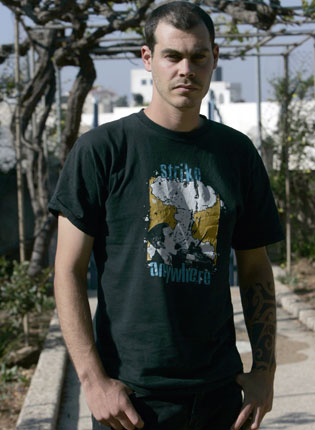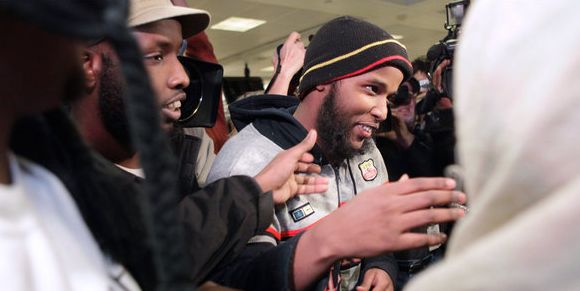Joseph Dana writes:
 Of all the criminals involved with the 2008 Gaza war, an Israeli leftist will be going to jail for riding his bike against the war in Tel Aviv. Tel Aviv Magistrates court judge Yitzhak Yitzhak convicted Israeli leftist Jonathan Pollak of illegal assembly for his participation in a January 2008 Critical Mass ride against the siege on Gaza and then sentenced him to three months imprisonment that will begin on January 11th, 2011. Pollak was the only one detained at the said protest, and was accused of doing nothing other than riding his bicycle in the same manner as the rest of the protesters. The conviction activates an older three-month suspended sentence imposed on Pollak in a previous trial for protesting the construction of the Separation Barrier. An additional three month prison term was also imposed for the current conviction, which will be served concurrently. His imprisonment is part of a clear strategy of silencing dissent in the Israeli left.
Of all the criminals involved with the 2008 Gaza war, an Israeli leftist will be going to jail for riding his bike against the war in Tel Aviv. Tel Aviv Magistrates court judge Yitzhak Yitzhak convicted Israeli leftist Jonathan Pollak of illegal assembly for his participation in a January 2008 Critical Mass ride against the siege on Gaza and then sentenced him to three months imprisonment that will begin on January 11th, 2011. Pollak was the only one detained at the said protest, and was accused of doing nothing other than riding his bicycle in the same manner as the rest of the protesters. The conviction activates an older three-month suspended sentence imposed on Pollak in a previous trial for protesting the construction of the Separation Barrier. An additional three month prison term was also imposed for the current conviction, which will be served concurrently. His imprisonment is part of a clear strategy of silencing dissent in the Israeli left.
Jonathan Pollak is one of the founders of the Israeli leftist group “Anarchists Against the Wall“, which join weekly unarmed Palestinian protests throughout the West Bank against the Separation Wall and the Occupation. Since 2008, he has served the media coordinator of the Popular Struggle Coordination Committee, an Palestinian umbrella organization designed to garner media attention for the unarmed struggle in the West Bank.
Pollak gave the following statement in court today:
Your Honor, once found guilty, it is then customary for the accused to ask the court for leniency, and express remorse for having committed the offence. However, I find myself unable to do so. From its very beginning, this trial contained practically no disagreements over the facts. As the indictment states, I indeed rode my bicycle, alongside others, through the streets of Tel Aviv, to protest the siege on Gaza. And indeed, while riding our bicycles, which are legally vehicles belonging on the road, we may have slightly slowed down traffic. The sole and trivial disagreement in this entire case revolves around testimonies heard from police detectives, who claimed I played a leading role throughout the protest bicycle ride, something I, as well as the rest of the Defense witnesses, deny.
As said earlier, it is customary at this point of the proceedings to sound remorseful, and I would indeed like to voice my regrets regarding one particular aspect of that day’s events: if there is remorse in my heart, it is that, just as I argued during the trial, I did not play a prominent role in the protest that day, and thus did not fulfill my duty to do everything within my power to change the unbearable situation of Gaza’s inhabitants, and bring to an end Israel’s control over the Palestinians.
His Honor has stated during the court case, and will most likely state again in the future, that a trial is not a matter of politics, but of law. To this I reply that there is hardly anything to this trial except political disagreement. This Court may have impeded the mounting of an appropriate defense when it refused to hear arguments regarding political selectiveness in the Police’s conduct, but even from the testimonies which were admitted, it became clear such a selectiveness exists.
The subject of my alleged offense, as well as the motivation behind it were political. This is something that cannot be sidestepped. The State of Israel maintains an illegitimate, inhuman and illegal siege on the Gaza Strip, which still is occupied territory according to international law. This siege, carried out in my name and in yours as well, sir, in fact in all of our names, is a cruel collective punishment inflicted on ordinary citizens, residents of the Gaza strip, subjects-without-rights under Israeli occupation.
In the face of this reality, and as a stance against it, we chose on January 31st, 2008, to exercise the freedom of speech afforded to Jewish citizens of Israel. However, it appears that here in our one-of-many-faux-democracies in the Middle East, even this freedom is no longer freely granted, even to society’s privileged sons.
I am not surprised by the Court’s decision to convict me despite having no doubt in my mind that our actions on that day correspond to the most basic, elementary definitions of a person’s right to protest.
Indeed, as the Prosecution pointed out, a suspended prison sentence hung over my head at the time of the bicycle protest, having been convicted before under an identical article of law. And, although I still maintain I did not commit any offense whatsoever, I was aware of the possibility that under Israeli justice, my suspended sentence would be imposed.
I must add that, if His Honor decides to go ahead and impose my suspended prison sentence, I will go to prison wholeheartedly and with my head held high. It will be the justice system itself, I believe, that ought to lower its eyes in the face of the suffering inflicted on Gaza’s inhabitants, just like it lowers its eyes and averts its vision each and every day when faced with the realities of the occupation.
In a profile for The Independent, Donald Macintyre wrote:
[Pollak] attended the first of very many demonstrations as a months-old babe-in-arms at the huge mass rally in Tel Aviv calling for an end to the first Lebanon war in 1982. What makes him and his Israeli comrades unusual, however, is the decision to go beyond mere demonstrations to, as he himself puts it, “crossing sides, moving from protest to joining resistance”.
A high school dropout at 15, he was a teenage animal right activist, a cause with few Israeli adherents – and most of those Israelis who were part of it were anarchists. Very much part of Tel Aviv’s young counterculture in the politically relatively relaxed Nineties, Mr Pollak became one too. He remains an anarchist and a vegan, still a strong believer in animal rights, which he sees as consistent with his wider politics. For him, “racism, chauvinism, sexism, speciesism all come from the same place of belittling the other”, he said.
A few minor brushes with the law appear to have been enough to convince the army that he was not suitable material for compulsory military service. “I don’t think they wanted me any more than I wanted them,” he said. He spent two years in the Netherlands, living in a squat, before being deported back to Israel.
By this time, the second intifada was at its peak, and Mr Pollak found himself drawn, despite the dangers for a young Israeli of visiting the West Bank at the time, to the unarmed dimension of the Palestinian cause – including, most significantly, the very first anti-barrier protests in the West Bank village of Jayyous.
According to [Ayed] Morrar [the director of Budrus], a long-term opponent of armed uprising, “Jonathan… is a man trying to prove that those who believe in occupation cannot claim to be humanitarian or civilised. He also wants to prove that resisting oppression and occupation does not mean being a terrorist or killing”.




 Of all the criminals involved with the 2008 Gaza war, an Israeli leftist will be going to jail for riding his bike against the war in Tel Aviv. Tel Aviv Magistrates court judge Yitzhak Yitzhak convicted Israeli leftist Jonathan Pollak of illegal assembly for his participation in a January 2008 Critical Mass ride against the siege on Gaza and then sentenced him to three months imprisonment that will begin on January 11th, 2011. Pollak was the only one detained at the said protest, and was accused of doing nothing other than riding his bicycle in the same manner as the rest of the protesters. The conviction activates an older three-month suspended sentence imposed on Pollak in a previous trial for protesting the construction of the Separation Barrier. An additional three month prison term was also imposed for the current conviction, which will be served concurrently. His imprisonment is part of a clear strategy of silencing dissent in the Israeli left.
Of all the criminals involved with the 2008 Gaza war, an Israeli leftist will be going to jail for riding his bike against the war in Tel Aviv. Tel Aviv Magistrates court judge Yitzhak Yitzhak convicted Israeli leftist Jonathan Pollak of illegal assembly for his participation in a January 2008 Critical Mass ride against the siege on Gaza and then sentenced him to three months imprisonment that will begin on January 11th, 2011. Pollak was the only one detained at the said protest, and was accused of doing nothing other than riding his bicycle in the same manner as the rest of the protesters. The conviction activates an older three-month suspended sentence imposed on Pollak in a previous trial for protesting the construction of the Separation Barrier. An additional three month prison term was also imposed for the current conviction, which will be served concurrently. His imprisonment is part of a clear strategy of silencing dissent in the Israeli left.